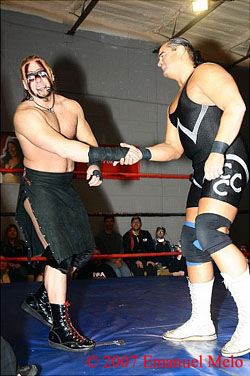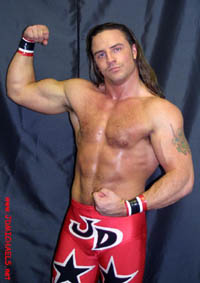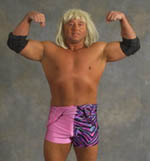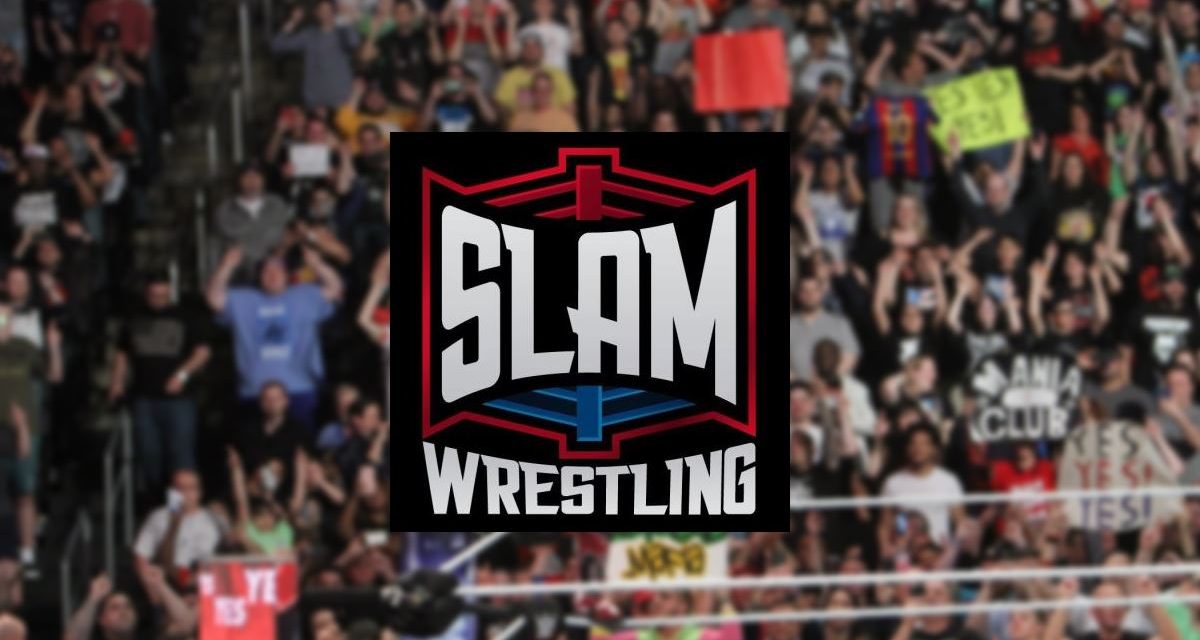WINNIPEG — Well-respected indy wrestler Chi Chi Cruz set off a firestorm that continues to rage through the business when he spoke out against green wrestlers offering their services for free.
His comments first appeared on his MySpace account and soon thereafter he conducted an interview with Declaration of Independents in which he lambasted freshly trained rookies and others wrestling for little or nothing. He condemned their actions, claiming they were killing the wrestling business and taking away veterans’ bookings. His remarks have garnered supporting articles from Johnny Devine and Lance Storm, and generated a great deal of feedback from other veterans.

Havok (Johnny Devine) and Chi Chi Cruz shake hands after their 30-minute draw at Stranglehold Wrestling’s April 8th show in Hamilton, ON. Photo by Emanuel Melo
Longtime pro Dusty Wolfe said every promotion has cancelled veterans’ bookings as a result of competition from cheaper workers.
“Including Vince/WWE. How’s that for pushing down future payoffs?” Wolfe asked. “I made more part-time in 1987 than the ‘superstars’ make on their first fulltime contract in 2007. And I didn’t start until April of that year. The ability to make money today, while I’m doing better than a lot of guys, has been damaged beyond belief.”
“Cheech had a lot of valid points and it really sucks when guys undercut others,” said Bobby Jay, who has wrestled across Western Canada and the northern U.S. since 1990 and had three TV matches with the WWE in 1992. “I had some deals going in the U.S. but the same thing happened with Winnipeg workers undercutting us — the guys I was getting booked and traveling with. As a worker you try to get the best deal you can.”
Cruz told SLAM! Wrestling that offenders, besides undercutting or bumping veterans off a show, are also hurting the future well being of the industry.
“It is being made a mockery of by guys that have no idea what they are doing in the ring besides imitating the cool stuff they saw on TV. These guys that will ‘wrestle’ for free or dirt cheap bring down the paydays for everybody as well as forcing the promoters to use more guys like them because the crowds go down, therefore putting more inexperienced guys in the ring, which increases the chance of disaster due to excessive risk taking,” Cruz said.
Cruz and JD Michaels, who also has lost bookings or has been overlooked for shows because he has been undercut, stressed that instead of offering one’s services for free after training, rookies looking for work should put videos of their matches together, call promoters to ask where to send their resumes and tapes and ask to be kept in mind for future shows.
If one has a light resume, one obviously will need to fill it, which could mean taking a hit on transportation and lower paydays, Michaels said. That, however, does not mean giving oneself away.
“Don’t ever offer to drive X-amount of hours here or there and then work for 20 bucks just for the experience,” Michaels said. “This is the wrestling business. The promoter is charging people at the door to watch a show you will be a part of.”
Michaels remembered a time when wrestlers stuck together to get better paydays from promoters, and many drove new cars paid for by their four to five show a week schedule. No longer is that the case thanks to “marks” behaving like “sluts.”
Michaels, who wrestles in a condensed area of Connecticut in which upwards of a dozen wrestling organizations operate, said many promotions there use the same group of people and similar match-ups simply because many of the guys are just wrestling for the experience. “But if you are out of your rookie year, what do you really learn from working the same greenhorns every other week if neither of you don’t really have a clue?” he asked.
Retired Canadian indy wrestler Stan Saxon said that if a rookie wants to work for free, he should do so by setting up the ring, taking ring jackets back to the dressing room, ring announce, keep time, or act as a runner.
“These are all jobs that need to be done but no one seems to want to do them because they are hot-shotted straight into the ring. Set up the ring for a year then maybe get a shot at reffing. Learn some stuff and maybe you’ll get a match doing a three minute job to a veteran. Work for free, yes. Wrestle for free virtually never, save benefit shows,” said Saxon, a 20-year veteran who also worked as Brother Midnight and Doktorr X. “Anyone offering in-ring services for free is an absolute mark who needs to be in the seats… Undercutting is bad but wrestling for free is worse. It’s the ultimate undercut.”
All but one relatively green wrestler contacted by SLAM! Wrestling refused to address the issue.

Jesse Fry
Jesse Fry, a Winnipegger who has wrestled off and on for a little over two years while attending high school and working three jobs, said he has in the past done free in-ring work for former River City Wrestling promoter Wayne Stanton as well as a Christian group called Wrestling for Christ.
“I haven’t had too much experience outside WFC. I did a few matches in RCW and never got paid, but it’s only normal for trainees to get spots on a show for experience purposes. I don’t think money is ever expected by someone at that level, we should be thankful for even getting a spot on a show in the first place. And I thank Mr. Wayne Stanton for giving me those opportunities,” Fry said.
He added he respected the veterans’ opinions and said he did not want to work any more spots until he underwent more training.
“They tell us we’re disrespecting the wrestling business by working shows for free, because charging nothing tells the consumer our product is worth nothing,” said Fry. “I’m still pretty new to the whole wrestling scene, so I have no right to argue that statement. If I’m going to be playing their game, I will have to play by their rules.”
Fry said he would work his way up as his predecessors had and try and earn their respect. “I have been doing a lot of thinking since all this controversy arose, and I think I need to listen to the people who know best.”
TRAINERS TO BLAME
“The trainer that tells his guys rasslin’ for free is part of paying dues has a lot of blame to share,” said Wolfe, who believed the current state of affairs would not change. “So I guess the guys are stuck. As long as schools keep pumping out the wannabes, there will be more product than demand. And most guys today don’t give a tinkers damn about money. As long as they can go out and play. It’s not a business to them.”
Cruz also placed part of the blame of rookies’ actions on their trainers since the latter are the first ones able to teach their students how they should conduct themselves.
“I can’t tell you how many times I’ve been in the dressing room and Johnny-ten matches walks in and doesn’t go around, shake everyone’s hand and introduce himself,” Michaels agreed.
The problem lies in the fact many trainers are not well trained themselves and have done little in the business.
“(Would-be wrestlers) need to be taught properly and with discipline. If that means being hurt along the way, so be it, this sport doesn’t need any more wimpy scrawny little wannabes,” Cruz said.
He added: “As a friendly word of advice to any aspiring young wrestlers out there, find a qualified trainer. If you go to a wrestler who will train you cheap and give you matches quickly, understand that you are most likely getting taken for a ride and will not be properly trained.
“Proper training isn’t cheap and I don’t think you should cut corners when it comes to this. Also, if you don’t want to make a career out of this, if you want to just wrestle part time, just remain a fan. This sport is inundated with guys that have no aspirations aside from impressing a few girls and their friends. They just want to do the latest hurraca-powerbomb-flippyplex and be a hero for the night.”
VETS MUST TAKE RESPONSIBILITY
Many wrestlers felt it is up to the veterans to take a more active role in policing the sport.
When he started out, Michaels said he walked on egg shells around vets who had worked for 10 or 20 years, and often saw stars wrestling them as they chopped and knocked him around the ring.
“But the more I took it and never said anything about it, the more they lightened up to the point where some were literally light as a feather,” Michaels said. “Wrestling needs these vets to do this to the greenhorns. There is a huge lack of respect on the indies. Johnny-ten matches thinks just because you share the same locker room that you are the same on every level. You offer him advice, he acts like he’s listening, but then he runs home and fake posts on message boards how you’re a know-it-all with an attitude or you have an ego because you were telling him what to do. It makes me wanna say, ‘Fuck ‘em, I ain’t helping any of them.'”
Saxon too believed “true veterans have a duty to protect the business, even if the promoter doesn’t see it or like it.”
“I was always taught to ‘stretch’ those who didn’t belong. I am proud to say that when I was a rookie I was stretched like crazy in training and in my first few matches. I always came back and proved my worth to the veterans,” said Saxon. “The old style was to make the experience so unpleasant for the mark claiming to be a wrestler that he’ll never come back. The mark can be stretched physically in-ring or mentally through strong inhumane ribbing. I have seen some ribs in the business so harsh I won’t even talk about them to anyone with less than 12 years in the biz because it was a totally different world compared to now.”
That sort of intimidation, though, can be difficult to get away with in these more sensitive times, Saxon said.
“It’s not always an easy choice to stretch a jabronie and protect the biz as one should. Promoters these days are marks themselves. So, when a vet kicks the tar out of someone who doesn’t belong, the vet may be fired. Often the vets have to choose between paying the mortgage and protecting the biz. Sad, but I’ve been there. I’m quite glad I’m not there now,” Saxon said.
Another part of the problem may be there are not enough veterans on the scene.
“It’s a huge problem right now because the guys with experience aren’t there to help these new wrestlers learn how to do this properly. It’s embarrassing watching most new guys on indy shows,” Cruz said.

J.D. Michaels
Michaels admitted amazement to being one of the senior wrestlers in many locker rooms in spite of having only six years of experience under his belt.
“There is a serious lack of veterans on the indy scene. Wrestling needs these veterans,” Michaels said. “Even if guys have three, four years under their belt, they didn’t learn shit and are clueless on how to actually tell a story and have psychology in a match. The only guys I haven’t had to carry in the last 15 months have been Kid Kash, Xavier and Kazarian. It gets boring working guys and telling them when to hit you, when to fire up and having to nix 800 highspots per match. In December I was in a tag match and buddy says, ‘So, that’s when I’ll tag in and just get all my shit in.’ Funny thing was we weren’t even talking the comeback.”
Adding to the challenge is that the veterans who are around do not always protect the business as they should, Saxon said. He explained that in 2000 or 2001, a Maritime promoter (“the last standing ‘territory’ at the time”) once told him and other wrestlers to take a 40% pay cut to maintain their positions because he had a group of young wrestlers who wanted spots.
“A bunch of untrained backyard kids were running shows in Newfoundland and when school was out at the end of June they wanted to get booked to this promotion. They sent tapes of their psychology-free matches of flips and jumps etc. I don’t know if they offered to work for free or not. I suspect it because, well, I saw the tapes,” Saxon said.
Saxon refused to take the cut but somehow maintained his spot. “Others on the crew, some who are now touted as ‘vets,’ sheepishly agreed to the pay cut… I lost some respect for the folks who accepted the proposal like typical marks.”
WHAT ABOUT PROMOTERS?
Promoters also have to take their share of the blame for dragging the business beyond a disgusting state, Michaels said.
“You have a million ‘promoters,’ and I use that term loosely as most are just marks who gather a few bucks, a few workers’ e-mails, buy or rent a ring and run a shit-ass show that doesn’t draw because they don’t actually have a clue how to promote but turn around and tell everyone, ‘Hey, I’m the promoter,’ who if they actually knew anything, would know you get what you pay for,” Michaels said. “I’ve been working over six years now and am trying to get a decent — for indies — payday. But a promoter will turn around and say, ‘Well, for $100, I can get four guys instead of just you.’ But these four guys look like shit — they have no tan, no build, no professional looking gear and most of all, no clue how to really work or get real heat so they substitute it with a million highspots.”

“Beautiful” Bobby Jay
Jay, who also promoted 300 matches for Top Rope Championship Wrestling between 2000 and 2003, said indy promoters should use the best talent available but often cannot because of the price tag attached.
“Most indies draw from 30 to 200 people, so how much money is left for workers after other expenses are covered, such as building rent, insurance, marketing and advertising?” he asked.
Jay said promoters could cough up a big payoff to the whole crew, but they would lose money. If all those who shut down from staying in the red, there would be no indy wrestling.
“This is a sad but true, Catch 22 situation that has been around since I broke in and, unfortunately, will probably always be the case,” said Jay.
Former WWE superstar Lanny Poffo said rookies wrestling for free are “doing it for the experience or the love of wrestling,” and that no one should be pointing their fingers at the promoters for the problems on the indy scene.
“Wrestlers should promote their own shows and then find out it’s not that easy,” Poffo said. “If a wrestler, boxer, doctor or plumber winds up broke, they need to look in the mirror and blame themselves. It’s not the fault of the promoters.”
Wolfe also said he did not blame the promoters as they are trying to survive and make money.
“And the majority of promoters today don’t understand the concept of talent sells the tickets by getting over. They’ve been taught some lame concept of running the hometown, etc. So, I just wait ’til they start bitching about not selling tickets, and then ask, ‘Would they pay to see the product they’re putting out?'” Wolfe asked, and added: “Rasslin’ as a business is dead. Vince is now the only game in town, and it stays that way for another 10 to 15 years, barring some other scandal.”
WHAT YOU THINK
Should a rookie wrestler work for free to gain experience?
Sure, it’s a way to learn – 21% He’s being taken advantage of – 32%
No way – 40%
Undecided – 7%
Total Votes for this Question: 700
RELATED LINKS
- Part two: Promoters point fingers while discussing free talent
- March 11, 2007 Johnny Devine column: A message to those ruining the business
- www.myspace.com/chichicruz
- www.cheech.maritimewrestling.com
- www.jdmichaels.net
- www.myspace.com/bobbyjaywrestling
- www.bobbyjay.cjb.net
- www.lannypoffo.com

